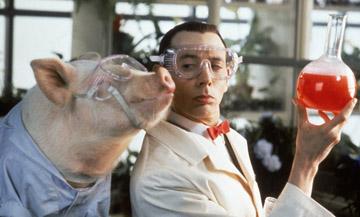Chapter Two
Big Top Pee-wee
By Brett Ballard-Beach
July 19, 2012
The only apt comparison I can make is to Jughead from the Archie comics, another fellow so asexually realized that giving him a girlfriend on occasion felt, if not exactly wrong, then definitely not right. Reubens walked this line perfectly in the first film, as Pee-wee seems uncomfortable around Dottie’s affections and is nothing more than a platonic friend for the waitress with the abusive boyfriend.
In Big Top Pee-wee, Pee-wee’s fiancée Winnie seems not to realize the man-child she has on her hands. She is unperturbed by his lack of affection for her egg salad sandwich, his obsession with stroking her hair, or his repeated attempts to jump on top of her. When his affections drift towards the acrobat Gina who has just (literally) blown into town along with a complete circus, their romantic tension culminates in a completely serious 90 second kiss complete with swelling music, a camera crane back and a brief push forward at the end, all in an unbroken shot. It’s magnificent as filmmaking, if one can stand aside from the subject matter. I am not sure how this works for or if it might interest the juvenile audience (I think it does neither for adults) but it feels inherently creepy.
I am aware that The Pee-wee Herman Show had both midnight versions for an adult audience and matinees for kids and families and that Big Top Pee-wee may have been an attempt to bring a little more maturity to his character, to bridge those two worlds in a PG and not R-rated manner, but the romantic melodrama plays out in a fairly realistic fashion even as it completely upends convention: Winnie and Pee-wee remain broken up after she discovers he has cheated on her. By the tale’s end, he has won Gina’s heart, and both have taken up with the circus, with Winnie betrothed to Gina’s four older brothers. If this is meant as subversion it fails and there aren’t enough gags or goodwill at hand to paper over the emotional void.
There are a few highlights worth mentioning: the charming opening credits sequence; the sight of Pee-wee lip-syncing on stage to “The Girl on The Flying Trapeze” (actually sung by Reubens) while wearing a bedazzled version of his signature gray suit; the moments when a woefully miscast but endearing Kris Kristofferson flashes a smile from underneath his surface-level gruff. These are however, few and far between, and what remains is something to be puzzled over, more so than enjoyed.
Postscript thoughts:
1) My uneasiness with the Pee-wee dichotomy may as yet prove to be more fully answered in coming years: Reubens is at work on one, possibly two big-screen reprises: a Playhouse road trip, and a dark “perils of fame” tale. Guess which one Judd Apatow is producing?
2) I found the Christmas episode of Playhouse to be a more enticing brew of the surreal, the unfathomable, and a kindly spirit than other episodes or Big Top, and all wrapped up in a festive holiday bow. My personal highlights were Grace Jones’ indescribable rendering of The Little Drummer Boy, k.d. lang’s boisterous romp through Jingle Bell Rock, and Cher’s introduction of the secret word, seemingly filmed right around the moment of her “If I Could Turn Back Time” commercial comeback.
Next time: A logical progression - Paul Reubens has played or voiced nearly four dozen non-Pee-wee roles, including several other Chapter Twos, in the last 35 years. Life During Wartime, Todd Solondz’ follow-up to Happiness, is one of them. DVD Spine #576
Continued:
1
2
3
4
|
|
|
|




